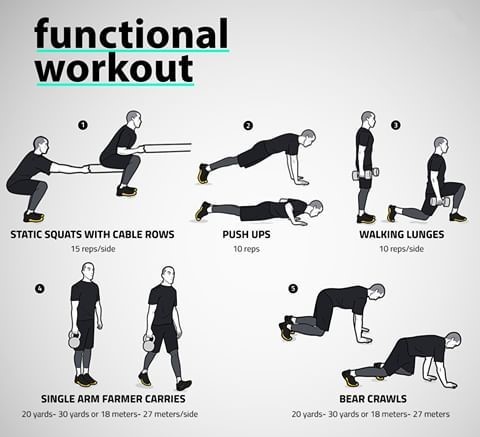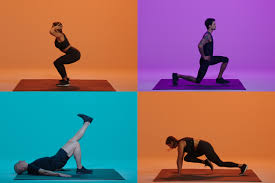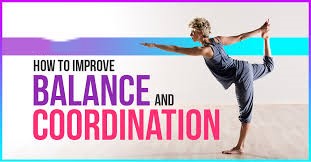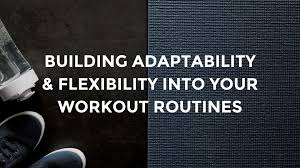
In the world of fitness, there’s a wide variety of workouts designed to improve strength, endurance, flexibility, or cardiovascular health. While many types of exercise focus on enhancing athletic performance or building muscle mass, functional training takes a different approach. It aims to improve your ability to perform everyday activities with ease and efficiency.
At GSFithub, we emphasize the importance of functional training as part of a well-rounded fitness routine. Functional exercises focus on training your body for real-life movements like lifting, bending, twisting, and reaching, helping you live a more active, pain-free life. Here’s a closer look at the benefits of functional training and why it’s a game-changer for everyone, from fitness enthusiasts to beginners.
What is Functional Training?
Functional training consists of exercises that mimic the movements you perform in everyday life, such as picking up groceries, climbing stairs, or bending to tie your shoes. Unlike traditional strength training, which often isolates specific muscles, functional training focuses on compound movements—exercises that engage multiple muscle groups and joints at once.

By incorporating functional movements like squats, lunges, deadlifts, and core exercises into your workouts, you develop the strength, stability, and mobility needed for everyday activities. This type of training improves overall body function, making day-to-day tasks easier and more efficient.
Improves Everyday Strength and Flexibility
One of the key benefits of functional training is that it builds functional strength—the kind of strength that directly applies to real-life movements.

Rather than focusing solely on aesthetics or muscle size, functional training enhances your ability to lift, push, pull, and move efficiently in your daily life.
For example:
- Squats mimic the movement of sitting down and standing up.
- Deadlifts replicate the action of bending down to pick up heavy objects.
- Overhead presses mirror the action of reaching for items on high shelves.
By training these movements, you’ll find that everyday tasks become easier and less strenuous. In addition, functional exercises improve your range of motion and flexibility, allowing you to move freely and without discomfort.
Enhances Balance and Coordination
As we age, balance and coordination naturally decline, which can lead to falls and injuries.

Functional training is highly effective at improving these aspects by challenging your stabilizer muscles—the smaller muscles around your joints that help maintain balance and control.
Many functional exercises, such as lunges, single-leg squats, or standing cable presses, require you to stabilize your core and maintain control of your body as you move. This helps improve your proprioception (awareness of body position) and strengthens the muscles that support your joints, reducing the risk of falls and injuries in everyday life.
Better balance and coordination mean you can move more confidently, whether it’s navigating uneven terrain, climbing stairs, or catching yourself from a slip or fall.
Reduces the Risk of Injury
Unlike isolated strength training, functional training engages multiple muscle groups at once, improving your body’s ability to work as a cohesive unit. This reduces the risk of muscle imbalances, which can lead to injuries over time.

Functional training also focuses on joint stability and mobility, two critical components for injury prevention. For example, exercises that strengthen your hips, knees, and lower back can help prevent common issues like knee pain or lower back injuries. By improving core stability and strengthening the muscles that support your joints, you become more resilient to the stresses of daily movement.
Incorporating functional training into your routine ensures that you’re not only building strength but also safeguarding your body against injury.
Increases Core Strength and Stability
Core strength is the foundation of almost every movement you perform, whether you’re lifting, walking, or bending. A strong core helps stabilize your body, protecting your spine and improving posture.

Functional training places a significant emphasis on core engagement, even when the exercises are not specifically targeting the abs. Movements like deadlifts, squats, kettlebell swings, and planks all require a strong and stable core to maintain balance and form.
A well-developed core improves your overall strength and stability, making it easier to move efficiently and avoid strain on your lower back. It also contributes to better posture, which is essential for reducing aches and pains associated with prolonged sitting or standing.
Adaptable for All Fitness Levels
One of the greatest advantages of functional training is its versatility. The exercises can be modified or scaled to suit any fitness level, making functional training accessible to beginners, older adults, and seasoned athletes alike.

For beginners, starting with bodyweight functional exercises like squats, lunges, and planks can help build foundational strength and improve movement patterns. As you progress, you can add resistance, such as dumbbells, kettlebells, or resistance bands, to increase the challenge and continue building strength.
At GSFithub, we offer personalized functional training programs designed to meet your unique fitness goals and abilities, ensuring that everyone can benefit from functional exercises in a safe and effective way.
Conclusion: Why Functional Training is a Game-Changer for Everyday Life
Functional training is more than just a workout—it’s a way to improve your quality of life. By focusing on movements that translate directly into your daily activities, functional training enhances your strength, flexibility, balance, and endurance, making everyday tasks easier and reducing the risk of injury. Whether you’re a beginner looking to improve basic fitness or an athlete seeking to enhance performance, functional training is adaptable and effective for all levels.
At GSFithub, we’re committed to helping you integrate functional training into your fitness routine, ensuring you move better, feel stronger, and live healthier. If you’re ready to experience the life-changing benefits of functional training, our team of expert trainers is here to guide you every step of the way.
Start incorporating functional exercises into your routine today, and experience the difference they can make in your everyday life!
